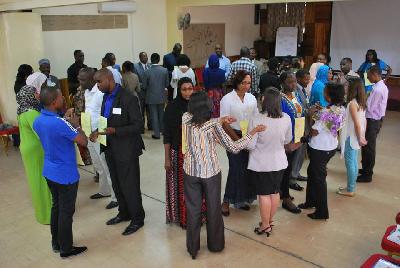A Basic Training Workshop for Facilitators on the use of the Learning to Live Together manual was held in Nairobi, Kenya from 13 – 15 January in collaboration with the GNRC.
 More than 40 participants from different parts of the continent and different faiths, working with children and youth, were part of the workshop. The workshop aimed at training GNRC national focal points on the approach, methodologies and resources of the Learning To Live Together Ethics Education program in order to strengthen their work with children and young people in inter-religious and inter-cultural contexts in their communities.
More than 40 participants from different parts of the continent and different faiths, working with children and youth, were part of the workshop. The workshop aimed at training GNRC national focal points on the approach, methodologies and resources of the Learning To Live Together Ethics Education program in order to strengthen their work with children and young people in inter-religious and inter-cultural contexts in their communities.
Dr. Mustafa Ali, Director of the Global Network of Religions for Children, GNRC, opened the workshop, thanked and welcomed all participants.
Following a get to know each other exercise, representatives from Arigatou International introduced the organization and its initiatives, the Learning to Live Together program and its educational approach. Participants discussed the importance of creating mechanisms and approaches to support the full development of the child. By sharing their views and perceptions of children as individuals in their own right, their potential, and what hinders their full and holistic development, participants identified the importance of not only working on the physical and emotional protection of children but also on their spiritual growth and development. On this first day, the participants were also invited to explore their spirituality by undertaking a journey, emulating the process which the children go through, following the Learning to Live Together approach. The following discussion was centered on the different understandings of spirituality and ethics and their relevance to education for children and youth.
 On the second day, the participants had opportunity to explore the learning modules of the Learning To Live Together programme: 1. Understanding ourselves and the others 2. Working together to transform the world. A discussion on the role as Ethics Education facilitators in enabling participatory and self-driven learning was proposed. Throughout the reflections and discussions, different thematics were touched and the participants shared to have a more practical idea of how to work with children using the methodologies and approach proposed.
On the second day, the participants had opportunity to explore the learning modules of the Learning To Live Together programme: 1. Understanding ourselves and the others 2. Working together to transform the world. A discussion on the role as Ethics Education facilitators in enabling participatory and self-driven learning was proposed. Throughout the reflections and discussions, different thematics were touched and the participants shared to have a more practical idea of how to work with children using the methodologies and approach proposed.
On the last day of the workshop, participants worked in groups and were guided to design different programs and sessions based on the Learning to Live Together in diverse contexts. They had the opportunity to present their work and get feedback from their colleagues and trainers.
Participants proposed the use of the manual in several settings, through peace education programs, anti-bullying activities, working with former child soldiers, children in areas affected by violence, in intercultural and inter religious programs, among others. Participants were interested to find ways to collaborate, develop joint activities, support each other and meet again to share experiences using the Learning to Live Together Program. Therefore, they manifested a vivid interest towards the creation of a community of practice and left fully committed in implementing the Learning to Live Together programme in their own contexts.
Special thanks go to the Arigatou International Secretariat in Nairobi for the logistical support of the workshop and to the trainers for their work.

